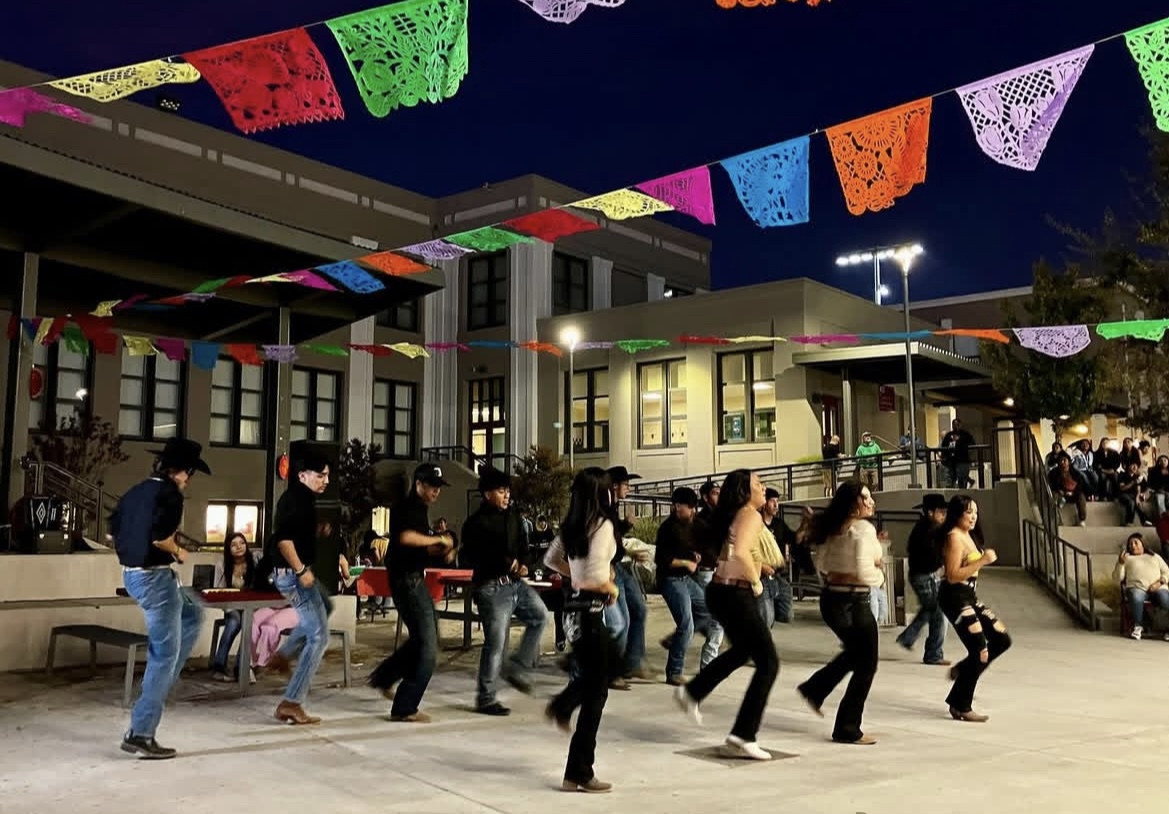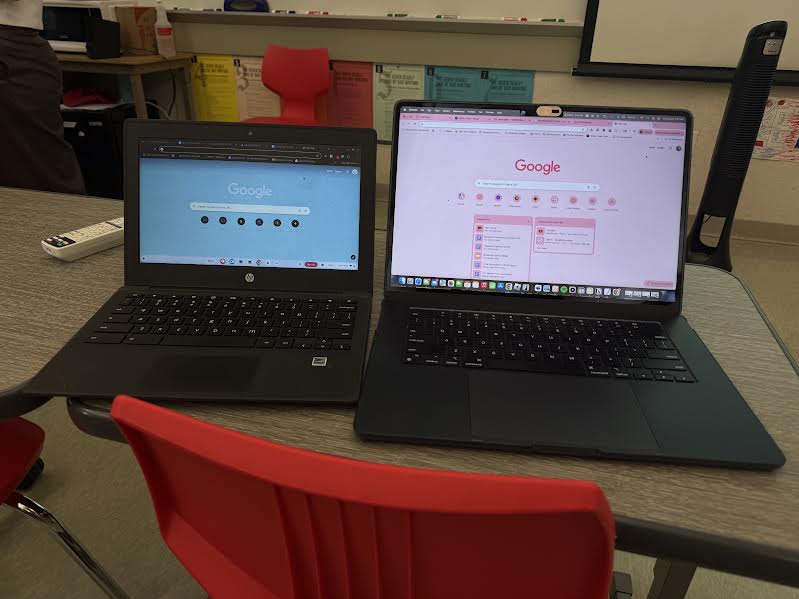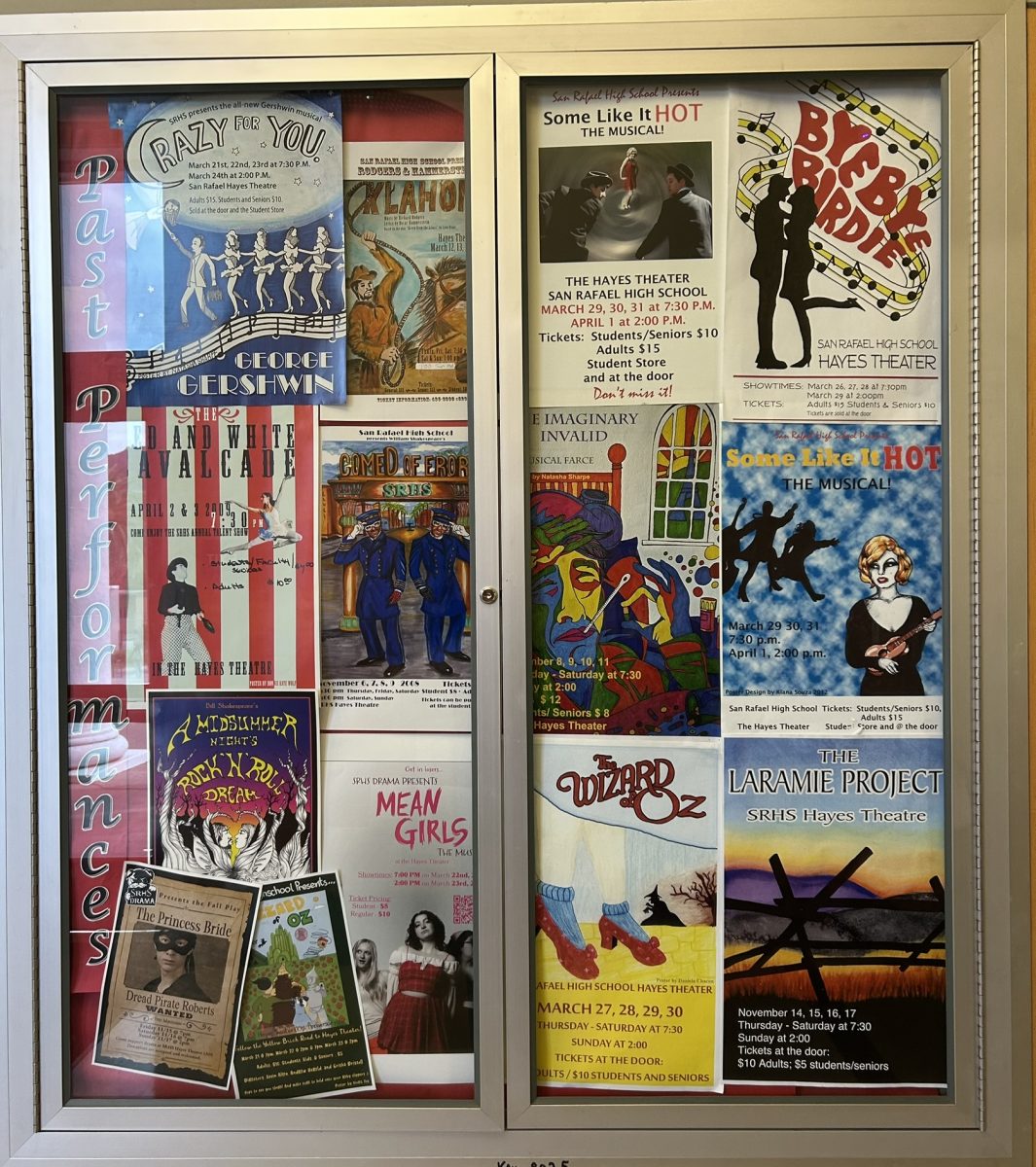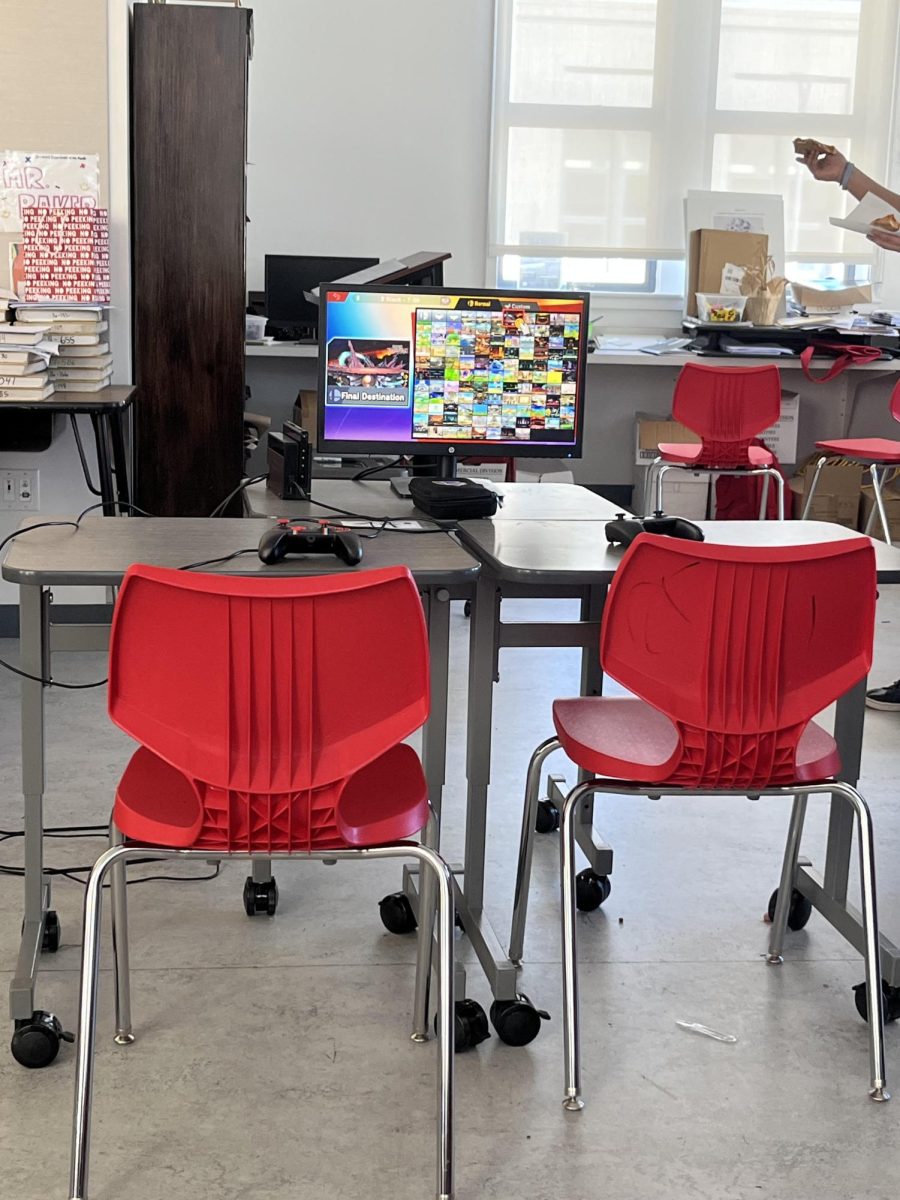If you were to take a walk around the San Rafael High School campus during Brunch or Lunch you’ll notice groups of students glued to their phones playing mobile games. To the average person that just looks like kids who can’t live without technology with no interpersonal relations to others. In reality, there is an unseen connection between the students that’s only visible to those who understand how much communication is required in multiplayer games. Junior Walter Armas said, “I use video games to separate myself from school so when I come back I am relaxed or calm.” Video games are often stereotyped by many teachers and parents but how do they have an effect on SRHS students?
“If you walk by people at lunch, oftentimes you see four or more people at a table, they’re all physically close to each other, but everybody has their phone out,” said Mr. Allen, a beloved History teacher with his bright smile and expressions. “It’s interesting to just see them all be in the same [space], no one is talking, but there is this like a social connection through the game even though you’re like two feet from each other.”
Mobile video games also take a toll on some teachers at SRHS, including Mr. Baker, a math teacher, who mentioned that he has struggled to manage his own playing of mobile games. “I’m actually addicted to some phone video games that I play too much and I have a note on my desk that says ‘DO NOT PLAY AT SCHOOL,’ ” he chuckled.
Today’s world is so affiliated and influenced with technology that it has immersed the rapidly developing industry, video games. Video games have become a huge part of our generation and now can be accessed anywhere. From phones, computers, consoles, smart watches, smart TV’s and more. Many students were introduced by parents, siblings, friends or on their own.
Students here however seem to have been introduced to video games mainly by their parents and siblings from a very young age. Tegan Mack, a senior, said that her father had caused her major familiarization of video games as he was and still is part of the video game industry. So she has been surrounded by video games for her whole life and has played “many types of games…all types of genres.”
Just like her, freshman Dante Craven has had a similar introduction to gaming. “My dad introduced me to some video games during like third grade,” he said. His hobby and interest in video games has expanded since then.
Similarly to Tegan and Dante, Alex McKay, a sophomore, said that he was introduced to gaming through his older brother, specifically through mobile games. Since then, he has expanded from mobile games to consoles like the Playstation and Xbox over the years.
On the other hand, junior Andrew Regan said he started playing video games during the start of middle school. “I mainly started when I didn’t really have any friends to talk with so it was something to pass time,” he said.
As most of the students here were introduced at a young age and built a life around video games which can be seen as the start to an obsession, and for some it is, all the others showed us that it has not caused as much harm then what most would think. To them, responsibility comes with playing video games. They have to balance homework and video games, manage time in order to not accidentally stay up too late. And solely use video games as a socialization outlet. For example, many of the students always do their homework before playing or at least try to. “I usually try to get it out of the way first,” said Brady Meyers, a freshman.
Some students have also created their own little strategies to help them stay scheduled and aware of the time. “Whenever I play, I’m listening to something else, [movies or a documentary] so if it’s for two hours I know that once that is done I have been playing for two hours […] I’m usually pretty conscious of what time it is when I’m playing,” said Mack.
“I just have a show in the background and that helps me keep track of time,” said Andrew.
On the other hand, for some students balancing homework and the urge to play video games can be difficult. For example, Cawshan Tran, a sophomore, was one of the students that said he often does lose track of time when playing. “If I’m locked in then, yeah, I do end up losing track of my time.”
Mr. Allen states that these games have had an effect on how many teenagers socialize over the years. “In a social perspective it’s interesting because I think that it replaces social interaction like actual interpersonal communication,” he said. Many teens here tend to play with friends and online friends, a mix of both on the daily.
One day after the brunch bells rang, the both of us were in the library for our free period getting ready to work on our AP Government homework. After doing our homework for a while, we took a break and started scrolling through social media until we saw a student pull out and set up his Nintendo Switch. We were both in shock. A Switch at school? How does that even work? We both have never seen anyone actually bring a video game console to school on a random Tuesday. As the student sat down, connecting the controllers, another student approached the table. All of a sudden, after a bit of mumbling between the two, both of their eyes became so focused, glued to the screen. Their faces twitching to slight smirks and furrowed brows as they were trying to hold back their expressions towards whatever was happening in the game as they held their joy con, slowly leaning towards the Switch. The silence was quickly broken once the match ended and they began to ramble on, genuinely showing content and socializing through the video game.
There has always been constant debate over the positive and negative effects of video games. A controversial topic is the power video games hold over teenagers socialization, many types of games are often based on its social experience.
Many students play video games with school friends, sometimes online friends while others play as a way to escape their everyday life. Games that involve quests and battles can help friends socialize. An article from JCFS Chicago states that children and teenagers spend more time playing video games with their friends and that it’s beneficial. “For most, this is a positive experience since it allows them to communicate with others even when they are unable to physically be with them.”
“I kinda play with a mix of school and online friends, but more with my friends from here,” said Federico Meja, a sophomore at SRHS. He plays video games where his friends communicate through the game by using voice chat. Some games he plays like this are Call of Duty, Fortnite and more.
If students play games by themselves, “it affects them socially detrimentally, but if they play with a group I think it can actually help them learn how to talk with people or work with people,” states Mr. Bond, an English teacher implementing games that require gamers to work together to win.
“I think the big shift is that now games in many ways act almost like social media,” said Mr. Allen.
When passing Mr. Baker’s room in the AD building sometimes you can catch him outside his room, usually greeting everyone with a fist bump, a big smile and a “Hellooo” even if has never taught you. He agrees that video games can be a positive and negative in certain ways when it comes to playing with or without friends. “If students play games by themselves, it affects them socially detrimentally, but if they play with a group I think it can actually help them learn how to talk with people or work with people,” said Mr.Baker.
Some teenagers actually welcomed people to each other’s lives through games. “Video games allowed me to make new friends online, so I didn’t feel alone,” said Regan.
Many SRHS staff and students believe socializing through video games can be a good and bad thing depending on the gamers habits. Mr. Hunt, a Math teacher, has mixed feelings. He argues that there are many kids who waste their time playing video games. “Instead of doing homework, going outside, instead of talking to people in person, instead of exercising, they’re playing video games,” Mr. Hunt said. It can also be a good thing if it’s solely as a social thing and that he in fact began playing video games to connect with friends he can not meet in person any more. “I strictly play video games as a social thing, to hang out with friends who I’d probably never be able to talk to if we don’t play video games,” he said. He states Fortnite was the main video game he occasionally plays with his friends.
Mr. Casper, a science teacher might not seem to be one who plays video games, but he also mentioned he plays Fortnite with his children where they both are able to bond. “In some games like Fortnite, I think it gives [students] the opportunity to actually play with their friends without actually being there,” said Mr. Casper.
“Gaming can have a positive impact because it can improve your social skills, if you’re playing with friends, but if you’re always online, then it can be a negative because it takes up too much time,” said Alex McKay.
Fortnite is actually a video game that Ashley and I play on occasions. We both communicate through voice chat and often end up talking about our day or certain things we did during the day. Like we’re on a phone call. Personally, I also play Fortnite with my cousin. Through the video game I am able to talk to him and have fun even though we are very far away from each other. My cousin lives about two hours away.
In our generation, video games have become a huge aspect in many teenagers’ lives, both entertainingly and socially. Technology entertainment’s evolution is the main reason why. When smart phones started booming so did the new video games available to download. Nokia 6610, a smart phone that was launched in 1997 introduced games like Snake and Bounce. But fast forwarding to 2007 when the first iPhone and Samsung phones were released. Mobile games were just a click away to download from the AppStore. Some of the most popular video games of this era were Angry Birds and Candy Crush. Our generation was raised at the same time as technology was evolving causing some to get sucked into loving video games and screens from a young age.
San Rafael High recently introduced a new club, The Nintendo Club. This club is hosted in Mr. Baker’s classroom and anyone is welcome to join. Everyday, students come into the newly remodeled math classroom during brunch and lunch to play video games or have club meetings (usually on certain Wednesdays).
Currently, two Juniors run it, Andrew Regan and Jaiquan Byrd. The two Juniors and other students part of the club bring their own Nintendo’s everyday to school. When lunch starts they rush to get lunch, then to Mr. Baker’s classroom and quickly hook it up to the new aesthetic whiteboard projector that was added just last year. The club initially started off only with four students but now has over 20 students that come to play. They usually only play Super Smash Bros and Mario Kart 8, but are currently trying to expand to hopefully bring in more students to join.
The warm air was filled with the smell of school lunch as we walked into the classroom. During the club there was lots of tension between the students playing, either one of the students was excited and hyped they were winning and the other was really into the game and serious. At the end of the match both students positively criticize each other. Some yelled a “NO” or let out a grin when playing. Conversations were constantly happening over and over within the two players but also with the others who were observing. In general the room was filled with positivity. Sometimes they split up the screen and play Mario Kart, but the many days we went in they were only playing Super Smash Bros.
“It’s a space that we know we could go to,” said Regan.
Throughout one of the days we were hanging out at the club during their meeting we heard them mention a competition that was going to happen with Terra Linda High School. You might be wondering how that will work. Well, TLHS has an E-sports club where they also play Super Smash Bros, so the competition would be the schools playing Smash against each other. Not for a prize or bragging rights, but to just be able to hangout and give advice to help each other get better.
The day of the competition was Friday after school in Mr. Baker’s classroom where four monitors were set up for the students from each school to play on and many chairs behind them so the rest of the students could sit and watch the match.
After a while of waiting in the room filled with anxiousness, Terra Linda students arrived repping their club merchandise and carrying their own Nintendo Switches. After a few fist bumps and hand shakes they were already playing some warm up matches as the captains of both clubs set up the ladder of the competition.
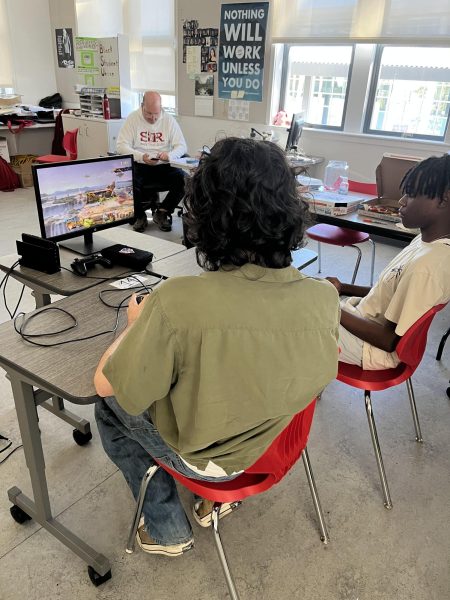 Some parents even came in support of them during the competition. Walter’s mother came over and stayed for a bit with a smile on her face as she saw her son surrounded by kids from SRHS and TLHS, eating pizza, watching the others playing. A mother of a TLHS student peeked into the classroom as she dropped off her son to say goodluck and a big thumbs up for the matches to come and said, “Have fun, go TL,” but was interrupted by Ms. Zampino, who said, ”Go Dawgs!”
Some parents even came in support of them during the competition. Walter’s mother came over and stayed for a bit with a smile on her face as she saw her son surrounded by kids from SRHS and TLHS, eating pizza, watching the others playing. A mother of a TLHS student peeked into the classroom as she dropped off her son to say goodluck and a big thumbs up for the matches to come and said, “Have fun, go TL,” but was interrupted by Ms. Zampino, who said, ”Go Dawgs!”
Then the real deal began as the matches came to play. The designated students from both schools went up to one of the four monitors, gave a handshake to the other player and started their match. We noticed that the match that seemed to be hyped up the most and was wanted to be seen by everyone was whoever was set to play on the big whiteboard screen. In fact, halfway through the first round when all the little monitors finished their matches, the match on the big screen was still going and everyone gathered round behind them watching their every move. There was this sudden unspoken rule to not say a word and let the players focus on their match. Whenever someone spoke, they were quickly shushed. Once the match ended, TL won, chaos broke out. There were gasps, grunts, laughs, cheers, topped off with the two players giving each other a handshake. Then it was the transition to the next round, everyone was talking, giving themselves seconds from the boxes of pizza and juice on the table towards the corner of the classroom, giving comments and advice to those who had just played.
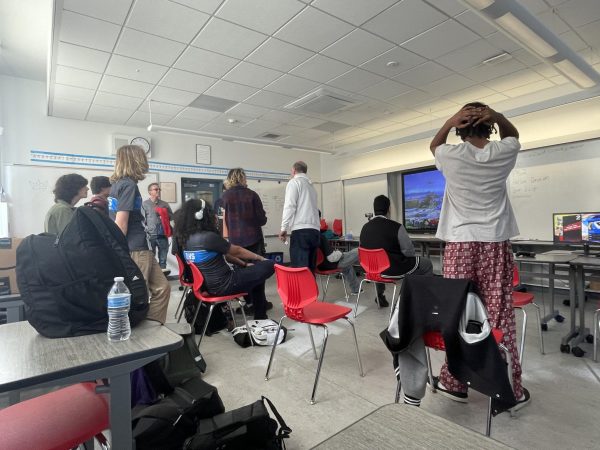
Teachers like this new type of socialization through video games with SRHS and TLHS. They think it’s different yet outstanding. “It’s cool for kids who aren’t really into athletics to have some sort of opportunity to compete with other schools, it’s good to have some sort of outlet to compete,” said Mr. Hunt.
Mack, who is not a part of the club, also has a positive thought on the club, “Being competitive is in our nature, it’s like play fighting and I think that’s part of what makes video games really good for connections”.
With an energetic voice and bright smile, Mr. Long, a math teacher from TL who hosts their E-sport club, said, “I think it’s important for students to have friendly rivalries, Esports is a very specific thing that not a lot of schools have tapped into”.
“It’s not like a rivalry where we hate each other, it’s a rivalry where we are praising each other’s skill and giving advice to each other,” said Armas.
One of TLHS students who is a part of the Esports Club, Anthony Sanchez enjoys the competitions. “Since our last game here, all of us are incredibly friendly to each other and look forward to our next matches,” he said.
Although this is a new extracurricular, having a gaming club like SR’s Nintendo Club and TL’s Esports club allows students to engage with each other and have fun with video games. The competitiveness that they have is a good thing to see, especially since it’s a friendly competition between the students that allows them to create deeper bonds and allow them to grow as a player and as a person who wants to get better and improve. Even if some may think it’s not worth it to build up skill in a video game, the fact they are building the mindset of wanting to get better at something you’re passionate about is important. To be able to acknowledge you need to get better, so you work on it is a skill many people run away from as they are scared to admit they just suck at something.
Lots of teachers and students mentioned the harm COVID-19 had with videogames and how that impacted them. Some students who became very isolated used video games to actually talk to their friends during the pandemic since they couldn’t do much during a harsh time, but that started up some habits for certain students like staying up late, “I try not to stay up late like I used to in middle school [end of eighth grade] where it was like I didn’t have the willpower to get offline,” said Mack.
Mr. Hunt said that he himself was a very anti-video games person but that shifted during the pandemic. “During quarantine even I started playing video games because I couldn’t hang out with my friends from the gym,” he stated.
As we mentioned, video games are often stereotyped by many in a negative way but the effect they have at SRHS isn’t that. Students positively bond through these games and can actually socialize with friends while having some fun. Some games have opened windows for student gamers allowing them to express themselves in their free time or with friends.
“For me, video games help some people to get to know other people and actually get themselves to talk to people and actually helped me a lot in that,” said Jaiquan Byrd.

